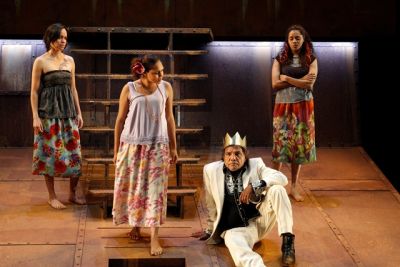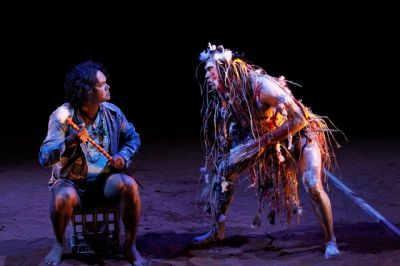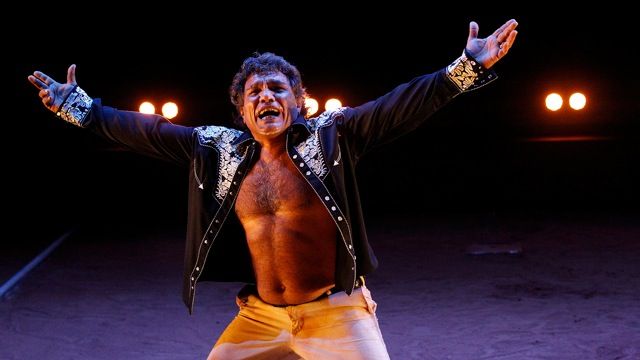The Shadow King
It isn’t necessary to know Shakespeare’s great tragedy King Lear before seeing this fascinating production. In fact, it’s probably better if you don’t; for, although The Shadow King borrows heavily from the Lear story, Shakespeare’s greatest strength is surely the marvellous poetry of his language, the rhythm and meter. That is all but discarded and replaced with new text, some in English, some in Kriol (pidjin) and some in native dialect, much of it paraphrasing the original text. For the most part this works, and it’s only when a few lines of Shakespeare’s original creep in, un-changed, that you realise the shortcomings of the script in terms of poetic language. Yet there is poetry of another kind at work.
For those who don’t know the story, basically King Lear, in his dotage, divides his lands between the two daughters who suck up to him, and rejects his youngest, Cordelia, who loves him in truth and sincerity, thus making Lear himself vain and shallow. As his daughters then reject him, he realises the injustice he has done to his youngest and descends into madness until he can find her and seek forgiveness. In the end he loses all three daughters and the land he so coveted…at least that’s the story this time out.
 The cast is excellent, drawn from indigenous and Torres Strait Islanders, although the first ten minutes seemed uneven and forced, as though Lewis and Kantor, responsible for the creation of the piece, are searching for style and impact. Co-creator Tom E. Lewis (Lear), an actor of great intensity, seems ill at ease in the first scene, and there’s a lack of genuine connection to his three daughters, but that could have been opening night nerves. All is forgiven as the cast finds its level, and what Lewis lacks in subtlety is more than compensated for by his immense power as he degenerates into madness. Jimi Bani (Edmond) shows us once again what a unique and charismatic actor he is. So strong is he, so developed his technique (what is it about WAAPA graduates?) that he almost acts the other cast members off the stage, making overall balance of performances uneven. But he is mesmerising at every turn, juggling humour and melodrama equally. Kamahi Djordon King, as a very wise and emotionally engaged fool, almost steals the play. He is quite wonderful. The rest of the cast, though still impressive, fare less well, but this is partially the fault of structure and script. The set is astonishing… a house, a prison, a huge mining truck, all are convincing. The use of video rather than stills in the projection is inspired. To see scenes played at Goneril’s house with dogs and kids running around in the background, is transporting.
The cast is excellent, drawn from indigenous and Torres Strait Islanders, although the first ten minutes seemed uneven and forced, as though Lewis and Kantor, responsible for the creation of the piece, are searching for style and impact. Co-creator Tom E. Lewis (Lear), an actor of great intensity, seems ill at ease in the first scene, and there’s a lack of genuine connection to his three daughters, but that could have been opening night nerves. All is forgiven as the cast finds its level, and what Lewis lacks in subtlety is more than compensated for by his immense power as he degenerates into madness. Jimi Bani (Edmond) shows us once again what a unique and charismatic actor he is. So strong is he, so developed his technique (what is it about WAAPA graduates?) that he almost acts the other cast members off the stage, making overall balance of performances uneven. But he is mesmerising at every turn, juggling humour and melodrama equally. Kamahi Djordon King, as a very wise and emotionally engaged fool, almost steals the play. He is quite wonderful. The rest of the cast, though still impressive, fare less well, but this is partially the fault of structure and script. The set is astonishing… a house, a prison, a huge mining truck, all are convincing. The use of video rather than stills in the projection is inspired. To see scenes played at Goneril’s house with dogs and kids running around in the background, is transporting.

But, clever though all of this is, what is mind-blowing about this production is its bravery and honesty, and credit for that must go to Lewis. It takes a lot, in a country like white Australia where we pride ourselves on being fair, and yet have pre-conceived judgements of our indigenous family, for someone in the indigenous community to say of his own people, ‘Yes, we hurt each other, we are violent and greedy and it’s not your fault. We have forgotten who we are.’ That is astonishing, for Lewis could have used this as a platform to condemn the mining industry. Instead, its presence is only implicit, and the condemnation is of shallowness and greed, a universal theme, no matter what colour. Shakespeare would have approved.
The most astonishing elements though are those which are still alien to us after more than two hundred years….the Aboriginal dancing, the didge, the haunting plaintive sounds of the singing, almost a wail; charged with so much emotion that the audience holds its breath, unable to swallow; and the connection to the land is omnipresent, the scene of cleansing with red earth (which brought this reviewer to tears), the purity and humanity of what was here before and always will be, and can never be owned (not by Lear or the corporate giants), these are things which transcend any shortcomings. It doesn’t matter if there are flaws in the production. We are transported by the bigger picture, and thoroughly entertained at the same time. It’s so rare these days to leave a theatre with your head and heart brimming with questions and the need for discussion.
Uncle Jack Charles said, in his brief and charming “Welcome to country” that ‘the whole world needs to see these fellas’. He’s right.
Coral Drouyn
Photographer: Jeff Busby
Subscribe to our E-Newsletter, buy our latest print edition or find a Performing Arts book at Book Nook.

